Iran's Currency Loses Value Despite Nuclear Talks Scheduled To Resume
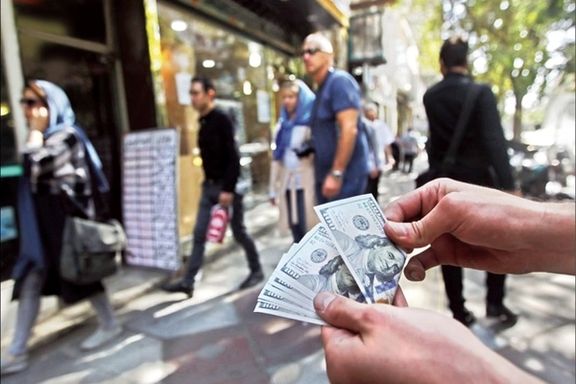
The value of Iran’s currency, rial, has dropped this week despite an announcement setting the date for the resumption of nuclear talks with world powers.

The value of Iran’s currency, rial, has dropped this week despite an announcement setting the date for the resumption of nuclear talks with world powers.
The rial on Sunday was trading close to 280,000 against the US dollar. There were hopes among Iranians that the national currency can rebound once positive news emerges regarding talks to revive the 2015 nuclear agreement, JCPOA. If the nuclear talks succeed, US oil and banking sanctions will be lifted, giving Iran a financial lifeline.
Earlier in the week the rial was slightly stronger at 260,000 to the dollar.
But despite these hopes, the rial has actually dropped further since the announcement to restart the JCPOA Vienna negotiation in the end of this month. The market reaction in Iran can show a lack of optimism about the outcome of the multilateral talks.
The Iranian rial has lost value ninefold against major currencies since the former US president Donald Trump indicated that he would withdraw from the nuclear deal and impose sanctions. Once he implemented his threat, rial’s fall accelerated in 2018.
Oil exports provide at least half the revenue the Iranian government needs to operate. In the absence of sufficient oil exports, the Central Bank of Iran has been printing money, with liquidity rising rapidly since 2017 and fueling inflation.
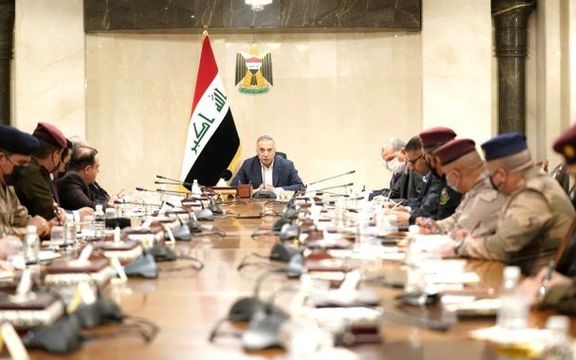
Iraqi Prime Minister Mustafa al-Kadhimi who escaped unharmed in an assassination attempt by armed drones in Baghdad on Sunday, held a security council meeting.
The incident dramatically raises tension in the country weeks after a general election disputed by Iran-backed militia groups.
Kadhimi appeared in a video footage published by his office on Sunday chairing a meeting with top security commanders to discuss the drone attack.
"The cowardly terrorist attack that targeted the home of the prime minister last night with the aim of assassinating him, is a serious targeting of the Iraqi state by criminal armed groups," the premier’s office said in a statement issued following the meeting.
Six members of Kadhimi's personal protection force stationed outside his residence in the Green Zone were wounded, security sources told Reuters.
Three drones were used in the attack, including two that were intercepted and downed by security forces while a third drone hit the residence, state news agency INA quoted an interior ministry spokesman as saying.
A spokesman for the armed forces commander in chief said the security situation was stable inside the fortified Green Zone - which houses the residence, government buildings and foreign embassies - following the attack.
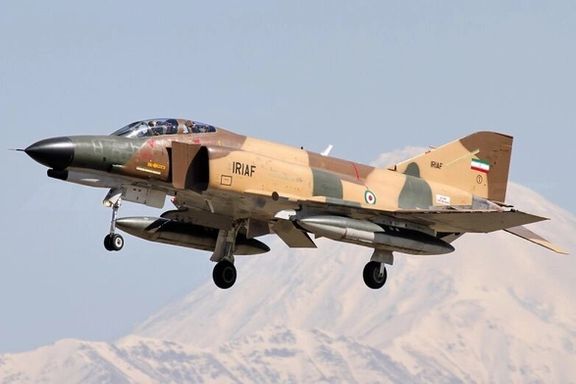
The traditional Iranian Army (Artesh) has begun exercises in the Sea of Oman area deploying ground, air and navy units, state-controlled media reported Sunday.
Iranian armed forces are divided into the traditional army and the Islamic Revolution Guard Corps (IRGC), each with many parallel units, such as armor, artillery and navies.
The army’s drills cover an area of one million sq kilometers or 386,000 sq miles, well over half the territory of Iran. Navy vessels and submarines, as well as air force planes and drones are taking part.
Tasnim news agency reported that American-made F4 Phantom interceptors and fighter bombers fired “air-to-ship optimized missiles”. Some Phantoms acquired in the early 1970s during the monarchy are still in operation.
Iran does not have a fully equipped modern air force due to decades of sanctions but it maintains some American and Russian-made warplanes. It relies heavily on a ballistic missile force to intimidate regional adversaries.
The exercises come after Israeli officials have recently said their armed forces are preparing for a possible war with Iran, given the fast progress its nuclear program is making. Israel has repeatedly vowed it will never allow Iran to acquire nuclear weapons.
An Israeli official told Iran International on October 25 that attacking Iran was now the Israeli air force’s top priority.
Iranian state television said that the aim of the drills is “to boost preparedness for confronting foreign threats and any kind of invasion.”
Iran has been enriching uranium to 60 percent and has accumulated 25 kilograms of the highly purified fissile material, which has no civilian use.
Tensions are high in the region as nuclear talks between Iran and world powers are set to restart on November 29. The United States has warned that if Iran does not come to an agreement to limit its nuclear program, “other options” exist.
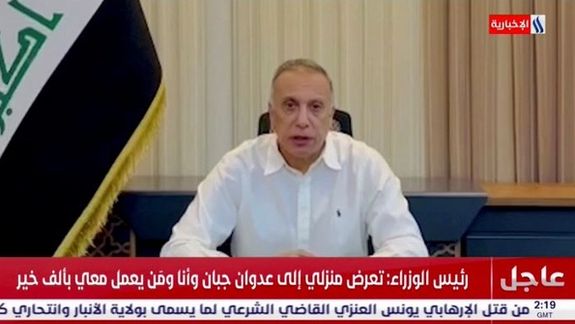
Iraq's Prime Minister Mustafa al-Kadhimi survived an assassination attempt with armed drones that targeted his residence early Sunday but he is unharmed.
The attack was a major escalation amid tensions sparked by the refusal of Iran-backed militias to accept last month's parliamentary election results.
Two Iraqi officials told The Associated Press that seven of al-Kadhimi's security guards were injured in the attack with two armed drones which occurred in Baghdad's heavily fortified Green Zone area. They spoke on condition of anonymity because they were not authorized to give official statements.
The Prime Minister was quick to respond on Twitter, “The rockets of treason will not shake one bit of the steadfastness and determination of the heroic security forces.” He added, “I am fine and among my people. Thank god."
Later he addressed the nation on television.
The US State Department condemned the attack and offered assistance with the investigation.
"This apparent act of terrorism, which we strongly condemn, was directed at the heart of the Iraqi state," spokesman Ned Price said in a statement. "We are in close touch with the Iraqi security forces charged with upholding Iraq’s sovereignty and independence and have offered our assistance as they investigate this attack."
Although no one has taken responsibility, suspicions will fall on Iran-backed militias after large protests on Friday against the results of the recent parliamentary elections. The incident can become a major embarrassment for Tehran.
Iran's top security official, Ali Shamkhani, condemned the attack, calling it "a new sedition". "The attempt ... is a new sedition that must be traced back to foreign think-tanks," he said on Twitter, without giving further details. It is not clear what he meant by foreign think-tanks.
A security official from the Iran-backed Kataib Hezbollah group in Iraq later dismissed suggestions that Iraqi groups were behind the attack.
"According to our confirmed information, no-one in Iraq has the desire to waste a drone on the house of a former prime minister," Abu Ali Al-Askari said on Telegram.
After the parliamentary elections once the new legislature convenes it should choose a prime minister, but for now Kadhimi continues to perform his duties.
Kataib Hezbollah and other Iran-aligned militias in Iraq are among the groups that are hostile to Kadhimi.
Saudi Arabia's foreign ministry said the kingdom condemns the attack on Iraqi Prime Minister Mustafa Al-Kadhimi in Baghdad early on Sunday, calling it a "cowardly terrorist act", Saudi-owned Al-Arabiya TV reported.
"It's premature now to say who carried out the attack," the security official on condition of anonymity as he was not authorized to comment on security details. "We're checking our intelligence reports and waiting for initial investigation results to point the finger at perpetrators."
In a statement, the government said the drones tried to hit al-Kadhimi’s home. Residents of Baghdad heard the sound of an explosion followed by gunfire from the direction of the Green Zone, which houses foreign embassies and government offices.
The statement released by state-run media said the failed assassination attempt was with “an explosives-laden drone that tried to target his residence in the Green Zone.”
“The security forces are taking the necessary measures in connection with this failed attempt,” it said.
The drone attack comes amid a stand-off between security forces and pro-Iran Shiite militias whose supporters have been camped outside the Green Zone for nearly a month after they rejected the results of Iraq’s parliamentary elections in which they were the biggest losers.
Updated at 8:45 GMT
Reporting by AP and Reuters
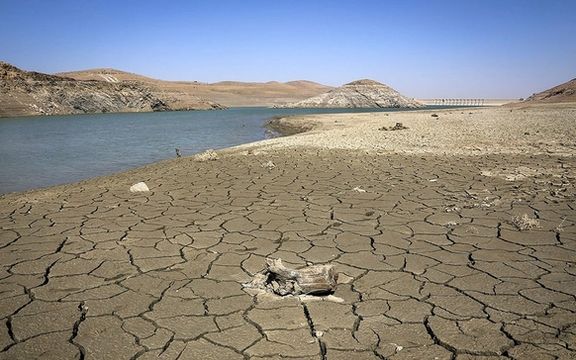
Critics blame Iran's development model, or lack of one, in the past few decades and unbalanced sectoral growth for much of the water crisis the in the country.
In an article this week headlined "Who Dried Up Iran?" the Tehran-based Fararu website attacked the development of water-intensive industries like steel for “plundering” the natural resource.
The website blamed those enjoying "rente"–a French word it used to imply privileges resulting from undue influence. "One can ask, which social groups are major benefiters of Iran's steel production and export?” the article asked. “They are naturally not the ordinary people on the streets.”
Water stress, which occurs when demand for water exceeds supply, has led to water shortage protests in affected areas, including the southwestern province of Khuzestan and the central province of Esfahan in July this year, and to tension between communities vying for water supply.
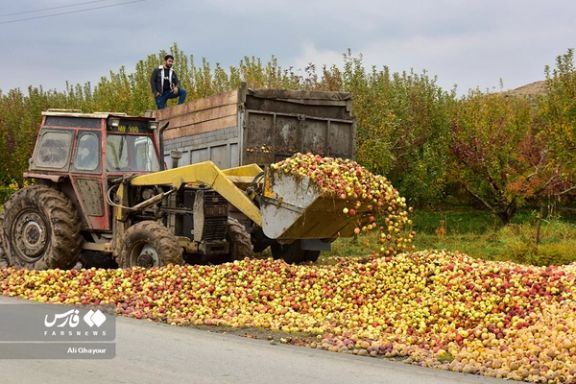
Drought and global warming have led in recent years across the wider region to water shortages in Syria, in Iraq where crop production has been halved, and in Saudi Arabia, where King Salman last week asked subject to pray for rain.
Several human factors, experts say, are contributing to the worsening situation: population growth, the demands of industries, mismanagement of water resources including as their allocation to water-intensive industries, and many crops including rice and sugarcane.
With nearly 30 million tons of steel production, Iran ranked 10th globally in 2020. With 700 liters of water required to produce a kilo of steel, most Iranian steel plants are in the driest areas of the country such as Esfahan, Arak, Yazd and Kerman provinces, or areas where water stress has emerged in the past few decades such as Khuzestan.
The government has encouraged extensive agriculture to ensure food security – with Supreme Leader Ali Khamenei an ardent champion − but the strategy depends on managing water stress, which can threaten not just water-intensive but other industries.
Fars news agency, which is affiliated to the Revolutionary Guards (IRGC), published Friday pictures of heaps of apples rotting alongside roads in West Azerbaijan province due to lack of demand. This year alone, Fars said, more than 100,000 tons of apples had gone to waste of the province’s production of over 1 million tons.
Yet experts say groundwater extraction and using the water of the once bountiful Zarrineh Rud − which feeds Urmia Lake − for irrigating apple trees have both contributed to the lake shrinking by nearly 95 percent in volume over the past 20 years.
With production of over 4 million tons of apples in 2019, Iran sat among the top ten producers of apples in the world. But according to the United Nation's Food and Agriculture Organization, around 700 liters of water is required to produce a kilo of the fruit.
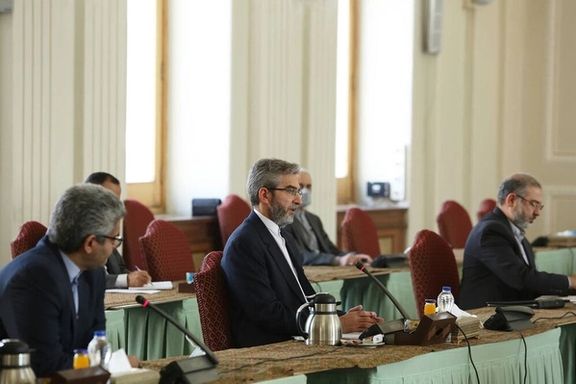
While nuclear talks between Iran and world powers are set to resume this month, there is little optimism among Iranian pundits about a quick, positive outcome.
News website Rouydad24 in Iran says the Raisi administration has failed in nearly all foreign negotiations during its first six months in office. The talks between Iran and Turkmenistan over the two countries' economic cooperation have been discontinued without signing even a single agreement.
The long meeting in Tehran between Afghanistan's neighbors remained fruitless and even annoyed the Taliban who were not invited to the meeting. And there are indications that the presence of individuals close to former chief negotiator Saeed Jalili in Iran's nuclear negotiating team is not likely to have any tangible result in the same way that months of negotiations led by Jalili before 2013 led to nowhere.
After Ali Bagheri-Kani Iran's chief nuclear negotiator said in a November 3 tweet that Iran has " agreed to restart the talks on November 29 in Vienna," Ali Vaez, the director of Iran Project at the Crisis Group, noted in a tweet on November 4 that Bagheri has used the word "starting" rather than "continuing" negotiations, and has called for "removing the sanctions" rather than "reviving the JCPOA."
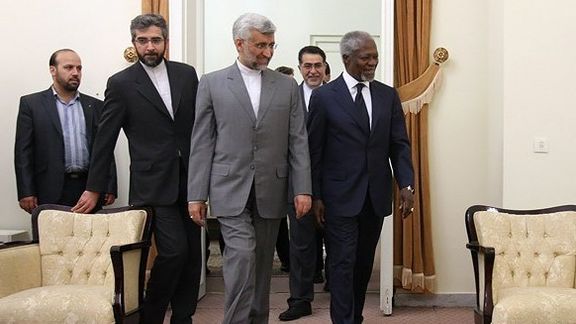
Rouydad24 wrote that looking at the Iranian foreign ministry's approach to the negotiations, it is unlikely that direct talks with the United States would be on its agenda. Also, it is clear that the team will be led by Bagheri, but it is still not known who else will be part of the negotiating team.
Meanwhile, Diako Hosseini, a commentator on Iran's foreign policy said in an interview that "The United States is not prepared to give Iran the guarantee Tehran wants about Washington's behavior toward Iran in the future," adding that "Plan B, that is a military strike on Iran will never happen even if the talks with Iran are not fruitful or even if such talks never start."
US President Joe Biden has spoken about Plan B if efforts to bring Iran to the negotiating table or reaching an agreement fail.
Hosseini said that the Plan B rhetoric is an outdated Trump tactic, adding that maximum pressures on Iran have led to nothing other than deepening the distrust on both sides and leading to the current impasse. He noted that based on Biden's declared policy on Iran taking an action such as attacking Iran will be impractical and catastrophic anyway.
Although some commentators in Iran and abroad have argued that sanctions have been ineffective in forcing Tehran to show flexibility, it was international sanctions that forced Iran to start nuclear negotiations in 2013.
Hosseini ruled out plan B as sheer propaganda and said he does not believe such a plan exists. He also noted that Iran might react to such measures by doing things that would make the situation even more complicated. However, he did not elaborate on Iran's possible actions.
The commentator further opined that such a plan is not likely to change Iran's position but reminded that next year the Republicans might win the majority in the US Congress and subsequently decide to leave the nuclear deal forever. This is one of the reasons Iran is after a guarantee about the continuation of the US commitment to the agreement.
Stressing that the talks to revive the JCPOA will be more difficult than the initial negotiations which led to the JCPOA, Hosseini said Tehran wishes to have the sanctions lifted, particularly the non-nuclear sanctions including restrictions on oil sales and international banking, and that is what has made returning to the talks more difficult.
However, he said negotiating, despite the existing distrust can prevent the deepening of the crisis. "Although it does not mean the talks can provide what Iran wants, yet they can be a beginning to the lifting of non-nuclear sanctions."